|
|
|
Sort Order |
|
|
|
Items / Page
|
|
|
|
|
|
|
| Srl | Item |
| 1 |
ID:
036456


|
|
|
|
|
| Publication |
Princeton, Princeton University Press, 1987.
|
| Description |
xi, 396p.
|
|
|
|
|
|
|
|
|
|
|
|
Copies: C:1/I:0,R:0,Q:0
Circulation
| Accession# | Call# | Current Location | Status | Policy | Location |
| 030127 | 335.47051/UNI 030127 | Main | On Shelf | General | |
|
|
|
|
| 2 |
ID:
105315


|
|
|
|
|
| Publication |
2011.
|
| Summary/Abstract |
This article traces the evolution of heightened Chinese expectations and the resultant spike in national identity in 2010, using a six-dimensional framework: 1) ideological, 2) temporal, 3) sectoral, 4) vertical, 5) horizontal, and 6) intensity. A hybrid ideology rose to the forefront. Forceful historical arguments covered three distinct periods. The triad of economic, cultural, and political identity raised sectoral identity to an unprecedented level. The leadership kept pressing the case for vertical identity in contrast to the West. Above all, it put the spotlight on horizontal identity to draw a sharper contrast with the United States and neighboring states as well. If at the time of the Hu-Obama summit the tone softened somewhat, China continued its risky wager on widening the identity gap. Regardless of whether China's foreign policy is currently assertive, its national identity narrative remains a driving force for divisiveness in the regional and international order.
|
|
|
|
|
|
|
|
|
|
|
|
|
|
|
|
| 3 |
ID:
103429
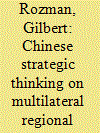

|
|
|
|
|
| Publication |
2011.
|
| Summary/Abstract |
This article argues that multilateral mechanisms for addressing security issues in East Asia are weak and that a key reason is the hollowness of China's ostensible and much-touted commitment to multilateralism. This is especially troubling when the region faces major security challenges and regional relations (and China's approach to them) appear to be moving from "economics in command" to "security in command." The article concludes with a prediction that "A coordinated approach to combining alliances and quasi-alliances exclusive of China with multilateralism inclusive of it will best test China's intentions during this decade."
|
|
|
|
|
|
|
|
|
|
|
|
|
|
|
|
| 4 |
ID:
100898
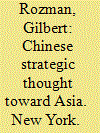

|
|
|
|
|
| Publication |
New York, Palgrave Macmillan, 2010.
|
| Description |
vii, 263p.
|
| Series |
Strategic thought in Northeast Asia
|
| Standard Number |
9781403975515, hbk
|
|
|
|
|
|
|
|
|
|
|
|
Copies: C:1/I:0,R:0,Q:0
Circulation
| Accession# | Call# | Current Location | Status | Policy | Location |
| 055549 | 327.5105/ROZ 055549 | Main | On Shelf | General | |
|
|
|
|
| 5 |
ID:
102375
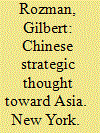

|
|
|
|
|
| Publication |
New York, Palgrave Macmillan, 2010.
|
| Description |
vii, 263p.
|
| Series |
Strategic thought in Northeast Asia
|
| Standard Number |
9781403975515, hbk
|
|
|
|
|
|
|
|
|
|
|
|
Copies: C:1/I:0,R:0,Q:0
Circulation
| Accession# | Call# | Current Location | Status | Policy | Location |
| 055809 | 327.5105/ROZ 055809 | Main | On Shelf | General | |
|
|
|
|
| 6 |
ID:
192953
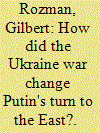

|
|
|
|
|
| Summary/Abstract |
Expectations that the Ukraine war would revitalize Vladimir Putin's "Turn to the East" were not realized. He had sought to link Ukraine and Taiwan in a struggle for a new order. If Xi Jinping's "Beijing straddle" countered the Washington-led international order, it mostly complied with Western sanctions. Russia had claimed to be the coequal driver of the reordering of the East, but a war presumed to raise its stature in China had the opposite effect. The "Turn to the East" shifted further to a "turn toward China," and Xi determines the timing of the East-West confrontation. The war, coupled with anger over the victory of Yoon Suk-yeol, tilted Moscow further to North Korea over South Korea. Japan finally pulled the plug on Shinzo Abe's legacy of wooing Putin. Russia's turn to China played poorly in India, too, although it clung to cooperation in part to restrain a further shift. Even Russian hopes for ASEAN were set back. The war's impact in the East defied Putin's intentions.
|
|
|
|
|
|
|
|
|
|
|
|
|
|
|
|
| 7 |
ID:
062370


|
|
|
|
|
| Publication |
London, I.B.Tauris, 1985.
|
| Description |
xiv, 292p.
|
| Standard Number |
1850430047
|
|
|
|
|
|
|
|
|
|
|
|
Copies: C:1/I:0,R:0,Q:0
Circulation
| Accession# | Call# | Current Location | Status | Policy | Location |
| 026867 | 305.50951/ROZ 026867 | Main | On Shelf | General | |
|
|
|
|
| 8 |
ID:
050861


|
|
|
| 9 |
ID:
098096


|
|
|
|
|
| Publication |
2010.
|
| Summary/Abstract |
A review of four periods and a comparison of three regional institutions provide evidence for how serious China has become about multilateralism with its neighbors in Asia. Approval for multilateralism does not mean that China is ready to endorse strong regional organizations that bind their members, especially when it has reservations both about institutions that could undermine its narrow notion of sovereignty and norms that could support US or even Japanese efforts to impose long-feared universal values. If China calculates that limited multilateralism now provides a variety of benefits, to date its support reflects specific circumstances, not general trust in this format. Focusing on the Six-Party Talks as the presumed foundation for regionalism in Northeast Asia offers a concentrated view of strategic thinking toward the area most vital to China's security. In the standoff between North Korea and the United States we are able to assess the degree to which China accepts working with four or five states and the prospects for its active support, if circumstances permit, for the establishment of a peace and security mechanism through the fifth working group that originated in the Joint Agreement of February 2007.
|
|
|
|
|
|
|
|
|
|
|
|
|
|
|
|
| 10 |
ID:
143257


|
|
|
|
|
| Summary/Abstract |
After assessing the “pivot” to Asia, the author contends that now is the time to split the rebalance of Asia in two—Northeast and Southeast Asia. Northeast Asia poses the more complicated challenge. The Northern Triangle of China, Russia and North Korea (despite appearances) is drawing together, but the U.S.-Japan-ROK Alliance is at an impasse. Serious differences exist between Japan and South Korea. Without this bilateral relationship working well, the rebalance to Northeast Asia is hampered in dealing with North Korea's regional diplomatic strategy, the regional strategy of Russia to transpose its notion of a “new Cold War” to the east, and the Chinese strategy of weakening U.S. alliances. U.S. rebalancing success versus determined adversaries has little chance unless Seoul and Beijing are in greater agreement.
|
|
|
|
|
|
|
|
|
|
|
|
|
|
|
|
| 11 |
ID:
001905


|
|
|
|
|
| Publication |
Armonk, New York, M E Sharpe, 1999.
|
| Description |
v.3 (xx, 240p.)
|
| Series |
Eurasia in the 21st century: the total security environment; v.3
|
| Contents |
Vol. 3
|
| Standard Number |
0765604345
|
|
|
|
|
|
|
|
|
|
|
|
Copies: C:1/I:0,R:0,Q:0
Circulation
| Accession# | Call# | Current Location | Status | Policy | Location |
| 042926 | 355.0310947/ROZ 042926 | Main | On Shelf | General | |
|
|
|
|
| 12 |
ID:
130175
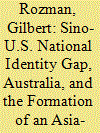

|
|
|
|
|
| Publication |
2014.
|
| Summary/Abstract |
Australia is a middle power caught between rising dependence on China, which seeks a sinocentric region, and growing security reliance on the U.S., which strives for a trans-Pacific community supporting universal values. In light of the Sino-U.S. identity gap and different concepts of regionalism, its response becomes clearer.
|
|
|
|
|
|
|
|
|
|
|
|
|
|
|
|
| 13 |
ID:
077758


|
|
|
| 14 |
ID:
155391


|
|
|
|
|
| Summary/Abstract |
Divergent views of Japan-Russia relations in 2017 result from leaving questions unanswered. This article seeks to answer the following queries. What is the sales pitch in Japan for Abe's wooing of Putin? Why is this rationale misleading? Why is Abe keen on pursuing Putin? What motivates Putin to encourage Abe yet hold back? When did talks hit a snag? Why was 2016 different from 2001? Is the US to blame for no breakthrough? What are the cause and effect of scapegoating for no summit success? Which Japanese criticisms—by the left or the right—of the summit make a better case? Do Abe and Putin have much freedom to maneuver? Where are Japan-Russia relations now headed? Through responses to these questions, we gain an understanding of the misleading coverage of the December 15–16 Putin visit to Japan and the difficulties ahead for Abe to achieve a breakthrough in Japan-Russia relations.
|
|
|
|
|
|
|
|
|
|
|
|
|
|
|
|
| 15 |
ID:
059493


|
|
|
|
|
| Publication |
Jan-Feb 2003.
|
|
|
|
|
|
|
|
|
|
|
|
|
|
|
|
|
|
|
|
|